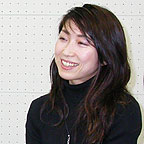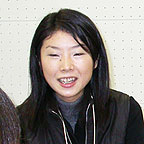An Interview with Tsumoto Mari (director) and Fujita Naomi (Daughter and Father project)
I Didn’t Want to Give Up on People

Q: What is the style of “Cinema Juku”?
TM: I think that for Hara Kazuo and “Cinema Juku,” it’s how to stand on the side of the main character, how much you can let go of your thinking and desires, and how the camera gives you support. Actually at first we didn’t get the go ahead for our project. It seemed Hara’s thinking was that it is important to create relationships with other people, and one’s own family is too easy.
FN: During the production Hara repeatedly pushed us with phrases like “resolution” and “fight for keeps,” and during the filming I was constantly thinking about how I could respond. That kind of intensity is also very characteristic.

Q: Fujita, did you have any doubts when it came to making a piece about your own family?
FN: It wasn’t our intention in creating this piece, but I was afraid that my father would be maligned, and at first I asked that the name of my hometown not be shown. But Hara told us “Expression itself is picking a fight with society, and that kind of cowardly approach to shooting is no good,” and “You guys are flinching.” Although I agreed with him at the time, I couldn’t imagine what would happen after going public with my personal life, and during the filming there were times when I was concerned.
Q: Had the ending been crystallized?
TM: Among the crew, opinions were divided as to whether we should be able to see the ending from the first stage, or whether it should emerge naturally as we began understanding Fujita’s feelings.
FN: When the crew met for the first time, I was thinking of an ending with me smiling at my father in gratitude. But after filming while observing my father, on our side we also were uneasy that we couldn’t shoot it yet, so there were some things that changed from the original plan, including other scenes. I think the actual ending was just before our imaginations.
Q: During production, was there ever anything that felt unexpected or unanticipated in your father’s response?
FN: Maybe when my father came to shoot that ending. Because I’d reminded him to say something persuasive. But when he came, he read out his one-way reply to my letter…And instead of in front of me, he read with dignity before the camera…(laugh).
TM: At first, I’d thought he came wanting to read that and bring it to a close. But in reality, even before Fujita had read the letter and conveyed her feelings, her father happened to read a newspaper article introducing “Cinema Juku” that said “The troubles Fujita, who had dropped out of school, had with her father…” But he didn’t say anything directly, even to Fujita.
FN: I think in some way my father also wanted to take in my feelings.
Q: What kind of people do you want to see this work?
FN: Around me there were also people with problems in their families, and a lot of people think their parents are hopeless, and that’s something they’ll put aside as they live their lives. At the same time, I was hearing people say they felt it’s somehow difficult to live. But I didn’t want to give up on people. Pushing through, there are things you see for the first time, and that way of coming to an understanding seemed like a way for me to move on. Regardless of age or circumstances, I’d like people who feel these kinds of difficulties in their personal relationships to see this film, and I would be happy if they connect it with their own motivating power.
Q: What about your next work?
TM: I think we’re now in a period when everyone is groping for relationships with others. The old way of seeing the world is breaking down, and if you follow the former way of doing things, relationships no longer get built automatically. Somehow it feels like people are being flung out on their own. In the middle of all this, I’m interested in how people go about creating relationships, and I’d like to make a piece centered around this.
(Compiled by Tanaka Rio)
Interviewers: Tanaka Rio, Hayasaka Shizuka
Photography: Endo Nao / Video: Oki Masaharu / 2003-10-13
